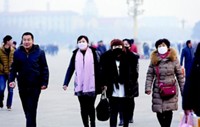Advertisement
Grab your lab coat. Let's get started
Welcome!
Welcome!
Create an account below to get 6 C&EN articles per month, receive newsletters and more - all free.
It seems this is your first time logging in online. Please enter the following information to continue.
As an ACS member you automatically get access to this site. All we need is few more details to create your reading experience.
Not you? Sign in with a different account.
Not you? Sign in with a different account.
ERROR 1
ERROR 1
ERROR 2
ERROR 2
ERROR 2
ERROR 2
ERROR 2
Password and Confirm password must match.
If you have an ACS member number, please enter it here so we can link this account to your membership. (optional)
ERROR 2
ACS values your privacy. By submitting your information, you are gaining access to C&EN and subscribing to our weekly newsletter. We use the information you provide to make your reading experience better, and we will never sell your data to third party members.
Environment
China Admits Setback
Premier vows country will try harder to meet environmental goals
by Jean-François Tremblay
March 12, 2007
| A version of this story appeared in
Volume 85, Issue 11

Chinese Premier Wen Jiabao admitted last week that his country failed in 2006 to meet the environmental emissions and energy efficiency targets that it had set in 2005. But he vowed that China will stick to its medium-term targets for 2010.
Wen was speaking in Beijing at the opening session of the annual meeting of the National People's Congress, China's parliament. Facing 3,000 parliamentarians and the world media, his address could not have been more public.
In 2006, China reduced its energy consumption per unit of gross national product by 1.2%, falling far short of the 4.0% target, he said. Instead of coming down 2.0%, emissions of sulfur dioxide increased 1.8%, and chemical oxygen demand, a measure of water pollution, grew by 1.2%.
Under its 11th national five-year plan, which ends in 2010, China aims to reduce its emissions of major pollutants by 10% and to raise its economic energy efficiency by 20%. "Meeting these mandatory targets cannot be revised, so we must work resolutely to meet them," Wen told delegates.
Partly to meet environmental goals, China will try to curb its economic growth to 8.0% in 2007, down from the 10.7% it achieved last year. In addition, the premier said the country will close smaller coal-fired power plants as well as substandard facilities producing cement, aluminum, ferrous alloys, coke, and calcium carbide.
China has difficulty enforcing national environmental standards, because the country operates in a decentralized manner that allows municipal and provincial officials to interpret Beijing's directives in their own way.
China's State Environmental Protection Agency reports on its website that its outspoken deputy director, Pan Yue, is urging a change in Chinese laws to correct this situation. Arguing that government officials are involved in the most severe cases of environmental violations, he is calling for new rules that would permit the central government to punish officials who fail to enforce national standards.





Join the conversation
Contact the reporter
Submit a Letter to the Editor for publication
Engage with us on Twitter